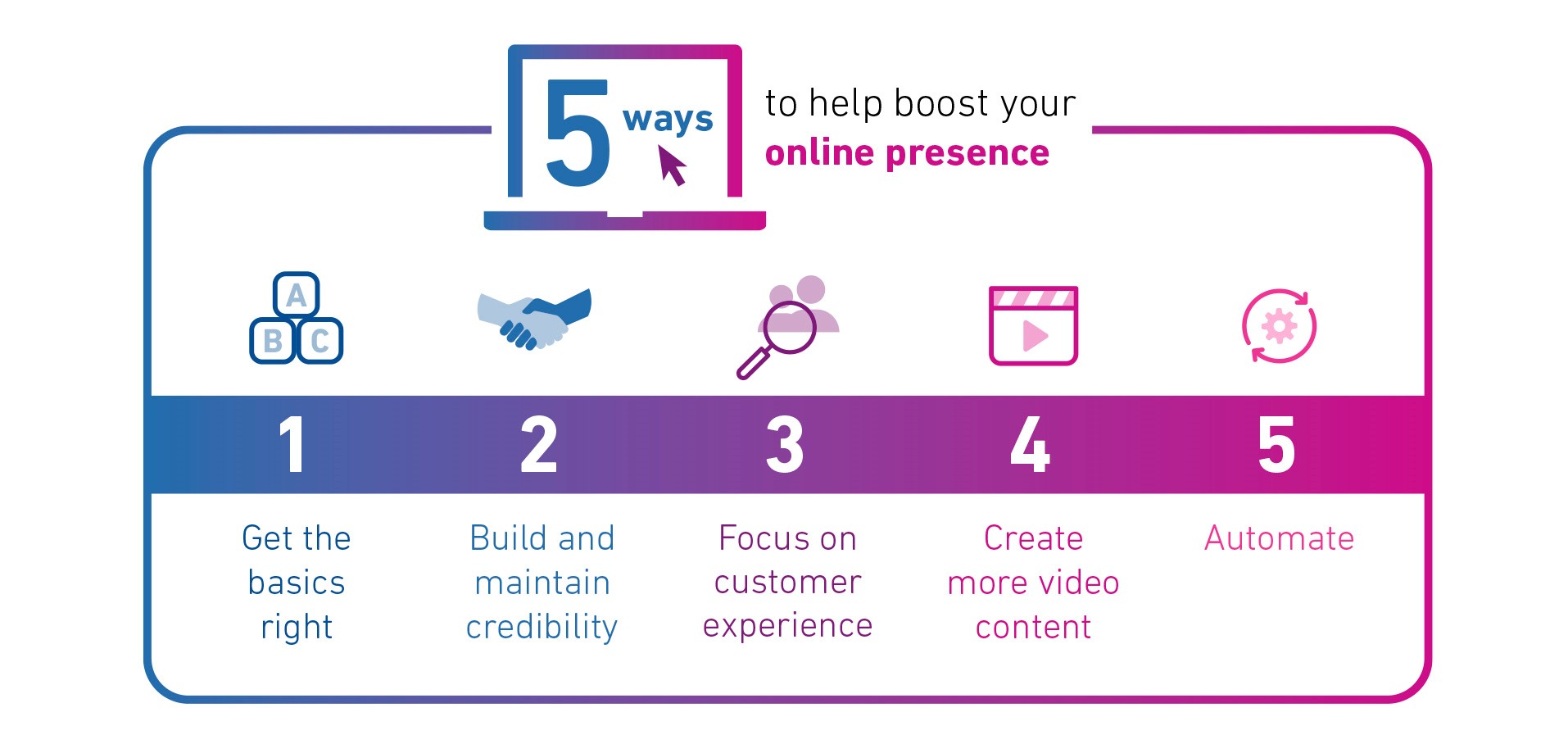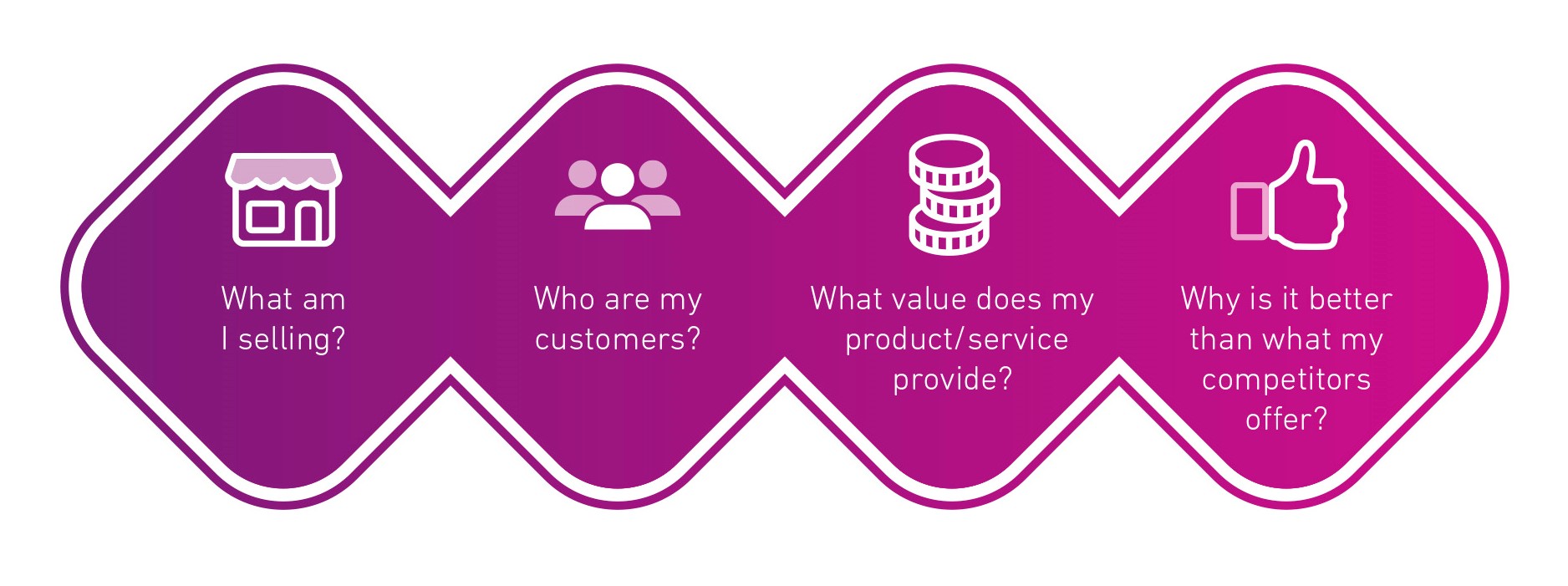5 ways to strengthen your business online presence
Why having a business online presence is important
Strengthening your business’s online presence is key to understanding and meeting your customers’ changing needs and preferences. Whatever sector or industry your business operates in, blending online and offline elements to create a hybrid customer experience is crucial.
What is an online presence?
An online presence can be defined by how easy it is to find your business when searching for relevant keywords online, or how many virtual ‘touchpoints’ a customer can interact with when wanting to find out more about your brand, products and services. If you have a good online presence, then you’ll be very visible on the internet and social media, making your online business far more ‘discoverable’ to potential new clients.
What is an online presence?
An online presence can be defined by how easy it is to find your business when searching for relevant keywords online, or how many virtual ‘touchpoints’ a customer can interact with when wanting to find out more about your brand, products and services.
Are you easy to find when consumers carry out searches using keywords relevant to your enterprise? Can existing and potential customers discover more about your brand through your online platforms and content? Do you stand out from your competitors when consumers are browsing and comparing your products and services? Can your customers communicate with you via multiple channels of their choice?
If you have an effective online presence, then you’ll be using a range of digital channels to deliver great customer experiences. With a growing array of digital platforms to choose from, focusing on the outcomes you want to achieve will help you to identify the channels that are right for you and your customers. For instance, if you’re a retailer, strengthening your online presence could mean merging e-commerce, mobile commerce and social channels, alongside a physical store experience, to give your customers a choice of ways to browse, buy and connect with your brand.
Want to know how to grow your business online presence? Here are five ways to help boost your online presence:

Read text version of infographic
1. Get the basics right
For many businesses, your online presence will start with your website, relevant social media platforms, and Google My Business listing. It’s worth ensuring you’re making the most of the basics before moving on to new digital platforms and tools. If you’re investigating how to build an online presence for your local business, creating a Google Business Profile is an important first step to local success. Local SEO (search engine optimisation) will be a very important strategy too to help your online business be visible in local search results.
Make sure your business website is optimised for search engines, so consumers can find you when they search for relevant products and services online. When you’re writing your website copy or listing products, use relevant keywords that customers might be using to find a business like yours. The recent growth of AI (artificial intelligence) tools to help create content may prove valuable to aid the development of your online presence.
Whilst you’re developing your business online presence, it’s important to stay focused on four basic questions – what am I selling; who are my customers; what value does my product/service provide; and, why is it better than what my competitors offer. This will help to keep your online messaging simple, consistent and relevant for your potential customers.

Read text version of infographic
Alongside keywords, Google1 has updated its algorithms to focus on helpful and original content. The more your content provides people with the information and results they’re looking for, the more likely it is to appear higher up in search rankings.
Researching the keywords consumers use to find relevant products, services and information will help you to identify key topics for your content. With more consumers browsing online to find the brands they want to engage with, taking the time to develop helpful and original content is a key opportunity for small businesses. For example, growing numbers of people want to do business with brands that share their values around environmental and social responsibility, so your content could focus on the sustainability of your enterprise. Small businesses are well-placed to provide sustainable options – from locally sourced, seasonal produce, to trusted information and advice.
Remember that your website needs to be optimised for mobile searches too. Visit Google’s Mobile Friendly Test page2 to check how your website performs.
You can strengthen your Google My Business listing by adding regular updates and customer reviews. Updates and reviews are another way to engage existing and potential customers and show them that you’re a trusted and valued brand.
When it comes to social media marketing for business, the key is to be active on the platforms that are most relevant to your customers. For B2B customers, that could mean prioritising LinkedIn or X for example, while for others, it could mean exploring other platforms like TikTok or BlueSky. Prioritising helpful and original content will give you a consistent online presence across different channels, while helping you to engage and support consumers looking for more interaction with brands. Customer research will help you to identify which platforms your existing and potential customers prioritise, and the type of content they’re interested in.
Create a Google Business Profile
Make sure your website is optimised for search engines
Keep your online messaging simple, consistent and relevant
Be active on social media platforms that are most relevant to your customers
2. Build and maintain credibility
As consumers think more carefully about the products and services they buy, influencers are becoming ever-more important.
Not all influencers are celebrities, many are niche influencers who specialise in topics relevant to your products and services. For instance, you could invite influencers to create guest content for your platforms such as a blog or video post, or ask them to promote your product or service on their social media channels. Working with niche influencers could help you to build a trusted brand, produce helpful and original content, and reach potential new customers.
Remember your customers could also be your best influencers. Encourage your customers to review you on Google and social media, and invite them to contribute user-generated content, such as a case study sharing their experience of working with you. Reputation management is a key ingredient in a digital strategy.
Teaming up with niche influencers will also help you to build stronger communities on social media, enabling you to engage with a targeted audience of people who share your brand values.
Consider working with relevant niche influencers
Encourage your customers to review you on Google and social media
Invite your customers to contribute user-generated content
3. Focus on customer experience – including personalised experiences
To take your website to the next level, explore how you could use computer generated environments to create helpful and engaging customer experiences online. From product simulations inviting consumers to browse and compare before they buy, to virtual tours introducing potential customers to your physical spaces. You could also repurpose this content for social media, including short video clips. These kinds of immersive customer experiences will show your customers why they should choose your products and services over your competitors.
Digital platforms like Zoom and WhatsApp came into their own during the pandemic and they continue to be useful tools for engaging with customers, providing extra customer service channels.

Explore how you could use computer generated environments
Consider digital platforms such as WhatsApp to provide additional customer service channels
Explore how you might reward loyal customers
4. Create more video content
Including video in your content marketing strategy is a great way to build your online presence. With consumers spending more time browsing and comparing products and services, and looking for brands that share their values, video can help to grab people’s attention and share your story.
Remember to focus on creating helpful, original and high-quality content, including videos featuring niche influencers and customers to build trust. The type of content and where you post it will be unique to your business, your audience, and the outcome you want to achieve. From showcasing the benefits of your products and services, to supporting your customers’ changing needs. Hosting videos on multiple digital channels relevant to your business also boosts your chances of being discovered online and enhances your digital presence.
Include video in your content marketing strategy
Focus on creating helpful and original video content
Host your videos on multiple digital channels to maximise your opportunities to be discovered online
5. Automate
Using digital tools to help build the online presence for your small business will save you time and resources. For instance, you could use social media scheduling tools to schedule your content to go live on your platforms, and email marketing software to send out email news and updates.
Marketing tools can also help you measure and analyse the effectiveness of your digital strategy, including your best performing content and how existing and potential customers are responding. This will help you to target budgets and resources in a much more focused way.
One of the biggest benefits of building your online presence is the vast amount of data you’ll be able to source. This can help you to better understand your customers’ behaviour and preferences in uncertain times and respond to meet their changing needs. You can also add to your customer data to create a B2B marketing email list that will allow you to reach the inboxes of those most likely to buy from you.
Key actions to take:
Use social media scheduling tools to schedule your content to go live
Use tools to measure the effectiveness of your online strategy
Add additional data to your customer data to create B2B marketing email lists
There are opportunities ahead
Despite the many economic and social challenges facing small businesses, there are opportunities for purpose-led enterprises to connect with customers looking for brands that share their values.
Building your online presence and being there for your customers as they navigate uncertain times won’t just help you to reach more people, it will help you to nurture long-lasting relationships with increasingly loyal customers.
How can we help?
We provide tools and solutions to help small business owners grow their business.
BusinessView is our largest and most accurate commercial business database. You can create highly targeted marketing and sales lists, meaning lower marketing costs. It offers accurate cross-channel contact data and in-depth insight to drive improved commercial marketing engagement. Extend the reach of your marketing campaigns with comprehensive prospect data, all in one place.
Text version of infographics
- Get the basics right
- Build and maintain credibility
- Focus on customer experience
- Create more video content
- Automate
- What am I selling?
- Who are my customers?
- What value does my product/service provide?
- Why is it better than what my competitors offer?









